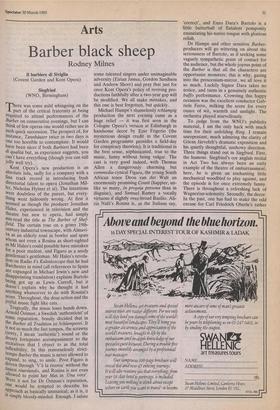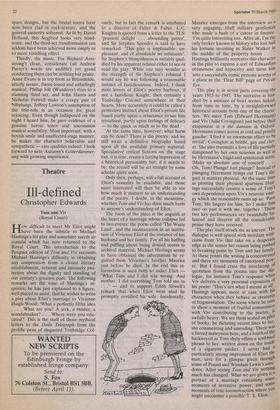Arts
Barber black sheep
Rodney Milnes
II barbiere di Siviglia (Covent Garden and Kent Opera) Siegfried (WNO, Birmingham)
There was some mild whingeing on the part of the critical fraternity at being required to attend performances of the Barber on consecutive evenings, but I can think of few operas one would rather see in such quick succession. The prospect of, for instance, Tannhauser twice in two days is one too horrible to contemplate. It would have been nicer if both Barbieri had been di qualitei but, as experience suggests, you can't have everything (though you can still Jolly well try). Kent Opera's new production is an absolute lulu, sadly for a company with a fine track record in introducing fresh directorial talent to opera (Jonathan Mil- ler, Nicholas Hytner et al). The intentions were doubtless of the purest, but every- thing went hideously wrong. At first it seemed as though the producer Jonathan Hales, experienced in television and the theatre but new to opera, had simply misread the title as The Barber of Shef- field. The curtain rose on a grimy 19th- century industrial townscape, with Almavi- va as an elderly roué in bowler and spats Whom not even a Rosina as short-sighted as Mr Hales's could possible have mistaken for a poor student, and Figaro as a seedy gentleman's gentleman. Mr Hales's revela- tion on Radio 4's Kaleidoscope that he had Barchester in mind (all references to Spain are expunged in Michael Irwin's new and disappointing translation) explains Bartolo being got up as Lewis Carroll, but it doesn't explain why he thought it had anything whatsoever to do with Rossini's score. Throughout, the dour action and the Joyful music fight like cats. Tragically, the music loses hands down. Arnold Ostman, a Swedish 'authenticise of some reputation, bossily decided that in the Barber all Tradition ist Schlamperei. It IS not so much the fast tempos, the scrawny (sorry, I mean 'authentic') sound or the dreary fortepiano accompaniment to the recitatives that I object to as the total Inflexibility. In this remorselessly strict- tempo Barber the music is never allowed to expand, to sing, to smile. Poor Figaro is driven through `V'e la risorsa' without the tiniest ritardando, and Rosina is not even allowed to point her Mas in 'Una voce. Were it not for Dr Ostman's reputation, °Ile would be tempted to describe his approach as basically unmusical; as it is, it iS sim-l_
p y bloody-minded. Enough. I salute some talented singers under unimaginable adversity (Eirian James, Gordon Sandison and Andrew Shore) and pray that just for once Kent Opera's policy of reviving pro- ductions faithfully after a two-year gap will be modified. We all make mistakes, and this one is best forgotten, but quickly.
Michael Hampe's shamelessly schlampig production the next evening came as a huge relief — it was first seen in the Cologne Opera's version at Edinburgh in handsome decor by Ezio Frigerio (the mysterious design credit in the Covent Garden programme provides a field-day for conspiracy theorists). It is traditional in the best sense, sophisticated, true to the music, funny without being vulgar. The cast is very good indeed, with Thomas Allen a dangerously charming but commedia-cynical Figaro, the young South African tenor Deon van der Walt an enormously promising Count (happier, un- like so many, in propria persona than in disguise), and Samuel Ramey a vocally virtuoso if slightly over-broad Basilio. Ali- cia Nafe's Rosina is, as the Italians say,
'correct', and Enzo Dara's Bartolo is a little butterball of flatulent pomposity enunciating his native tongue with glorious relish.
Dr Hampe and other sensitive Barber- producers will go wittering on about the seriousness of Bartolo, as if seeking some vaguely sympathetic point of contact for the audience, but the whole joyous point of the Barber is that all the characters are opportunist monsters; this is why, gazing into the proscenium-mirror, we all love it so much. Luckily Signor Dara takes no notice, and turns in a genuinely authentic buffo performance. Crowning this happy occasion was the excellent conductor Gab- riele Ferro, milking the score for every ounce of wit, warmth and sunlight. The orchestra played marvellously.
To judge from the WNO's publicity material, I am the only hack with much time for their unfolding Ring. I remain unrepentant, much admiring the clarity of Goran Jarvefelt's dramatic exposition and his quietly thoughtful, unshowy direction. Three things stand out in Siegfried. First, the humour. Siegfried's cor anglais recital in Act Two has always been an early example of the theatre of embarrassment; here, he is given an enchanting little mechanical woodbird to play against, and the episode is for once extremely funny. There is throughout a refreshing lack of Wagnerian solemnity. Secondly, the decor. In the past, one has had to make the odd excuse for Carl Friedrich Oberle's rather spare designs, but the brutal rostra have now been clad in rock-texture, and the general austerity softened. As lit by David Holland, this Siegfried looks very hand- some, and the third-act transformation can seldom have been achieved more simply or to more ravishing effect.
Thirdly, the music. For Richard Arm- strong's clean, considerate (all Andrew Porter's words are audible) yet grand conducting there can be nothing but praise. Anne Evans is in top form as Briinnhilde, utterly secure, flame-toned and unfailingly musical, Phillip Jo11 (Wanderer) rises to a stunning third act, and John Harris and Nicholas Folwell make a creepy pair of Nibelungs. Jeffrey Lawton's assumption of the title-role is an occasion for great rejoicing. Even though indisposed on the night I heard him, he gave evidence of a genuine heroic tenor and uncommon musical sensibility. Most important, with a boyish smile and unaffected stage manner, he makes the character believable and sympathetic — rare qualities indeed. I look forward to next Autumn's Gotterdiimmer- ung with growing impatience.















































 Previous page
Previous page